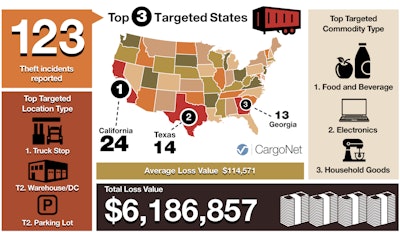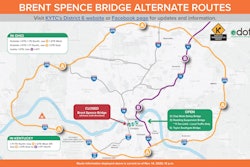Trucking news and briefs for Thursday, Nov. 19, 2020:
FMCSA unveils updated agricultural commodity, livestock definitions for HOS regs
The U.S. Department of Transportation will soon publish an interim final rule that clarifies agricultural commodity and livestock definitions in federal hours of service regulations to make enforcement of the regs more consistent. Specifically, the rule clarifies the definition of the terms “any agricultural commodity,” “livestock,” and “non-processed food,” as the terms are used in the definition of “agricultural commodity” for HOS regs.
For the definition of “livestock,” the Federal Motor Carrier Safety Administration is keeping the current definition, but also expanding it to include insects and “all other living animals,” including aquatic animals. The definition of “agricultural commodity” is being clarified to include horticultural products at risk of dying or degrading during transport.
“Our nation’s farmers and agriculture haulers will benefit from this clarification of the rules and will be able to deliver their products in a safer and more efficient manner,” said Federal Motor Carrier Safety Administration Deputy Administrator Wiley Deck. “These improved rules will help farmers move commodities and get food to our grocery stores. We have heard the concerns from our famers and ag haulers and we’ve worked closely with USDA and the industry to provide regulatory clarity and craft this new rule.”

Under current FMCSA regulations, drivers transporting agricultural commodities from their source to a location within 150 air miles of the source, during harvest and planting seasons as defined by each state, are exempt for hours of service regs. Additionally, livestock haulers are exempt from the 30-minute break provision while livestock are being hauled.
The existing definition of “agricultural commodity” that was adopted by Congress and used until now by FMCSA included “any agricultural commodity, non-processed food, feed, fiber or livestock.”
Under the interim final rule to be published in the coming days, “any agricultural commodity” will be defined as “horticultural products at risk of perishing, or degrading in quality, during transport by commercial motor vehicle, including plants, sod, flowers, shrubs, ornamentals, seedlings, live trees and Christmas trees.”
The existing definition of “livestock,” from the Emergency Livestock Feed Assistance Act of 1988 as amended by the 2018 farm bill, included “cattle, elk, reindeer, bison, horses, deer, sheep, goats, swine, poultry (including egg-producing poultry), llamas, alpacas, live fish, crawfish, and other animals that are part of a foundation herd (including dairy producing cattle) or offspring.”
FMCSA will now interpret “livestock” to include those animals, as well as “insects, and all other living animals cultivated, grown or raised for commercial purposes, including aquatic animals.”
Finally, the agency also clarified the definition of “non-processed food” as follows:
“Non-processed food means food commodities in a raw or natural state and not subjected to significant post-harvest changes to enhance shelf life, such as canning, jarring, freezing or drying. The term ‘non-processed food’ includes fresh fruits and vegetables, and cereal and oilseed crops which have been minimally processed by cleaning, cooling, trimming, cutting, chopping, shucking, bagging or packaging to facilitate transport by commercial motor vehicle.”
The interim final rule will be published in the Federal Register in the coming days and will take effect 15 days after it is published. FMCSA is asking for public comment on the revised definitions above, including answers to the following questions:
- Will the clarifications of the terms “any agricultural commodity,” “non-processed food,” and “livestock” result in more consistent application of the HOS exemptions? Why or why not?
- Will the clarifications impact the number of drivers who would use the exemptions? If so, how and to what extent? For example, how, if at all, will including all living animals cultivated, grown, or raised for commercial purposes, including aquatic animals, within the definition of “livestock” impact the number of drivers?
- Will any of the clarifications result in higher or lower costs for the transportation of agricultural commodities and livestock?
- Will any of the clarifications result in other benefits to stakeholders, including consumers and State enforcement personnel?
Overdrive will publish a link for comments on the changes when the rule is published in the Federal Register.
Be wary of increased cargo theft activity next week
Cargo theft recording firm CargoNet is warning the trucking industry of expected increased theft activity during the Thanksgiving holiday period in the United States next week.
 CargoNet’s recorded cargo theft data shows 123 recorded thefts during the Thanksgiving holiday period in the last five years.
CargoNet’s recorded cargo theft data shows 123 recorded thefts during the Thanksgiving holiday period in the last five years.The firm reviewed trucking theft data from the Tuesday before Thanksgiving through the Monday after Thanksgiving for 2015 to 2019 and found 123 recorded thefts in these days with 144 trucks, trailers, chassis and containers being stolen.
Theft events were highest in California, Texas and Georgia, but thefts were recorded in 24 total states. Theft activity peaked on the day before Thanksgiving with 23 events, but activity was also high on the Friday and Saturday after the holiday with 21 events each, CargoNet reports.
Some of the most commonly targeted items during this period were televisions, alcoholic beverages and major appliances.
“We caution that thefts of electronics have been down in 2020, while thefts of household paper products like toilet paper, cleaning products like disinfectant spray, and PPE have increased,” the firm noted in its warning.
CargoNet says truckers and carriers can mitigate theft by parking unattended equipment and cargo in high-security yards with tall fences, surveillance video and high-visibility lighting. The firm also suggests investing in high-security locks and seals to prevent trailer burglaries and tracking devices to monitor unattended equipment.
Some noteworthy thefts from recent Thanksgiving weeks include:
- $527,863 theft of coffee and peanuts from a warehouse in Union City, Georgia
- $481,000 theft of liquor from a warehouse in Orlando, Florida
- $414,255 theft of footwear from a secured yard in Kearny, New Jersey
- $319,150 theft of candy from an unsecured yard in Douglasville, Georgia
- $308,293 theft of televisions from an unsecured yard in Fontana, California
Canadian driver named Highway Angel for helping prevent suicide attempt
A Bison Transport driver based in Montreal, Quebec, has been named a Highway Angel by the Truckload Carriers Association for helping prevent a man from jumping off of a bridge.
 Bruno Filipe Da Costa Raposo and family
Bruno Filipe Da Costa Raposo and familyBruno Filipe Da Costa Raposo was driving along Highway 287 near Amarillo, Texas, on Aug. 24 when he saw something on a bridge up ahead. As he got closer, he realized it was a man about to jump off onto the roadway. As he approached, he put on his flashers, pulled over to the shoulder and stopped about 50 feet from the bridge.
He waited for a break in traffic, then positioned his truck and trailer to block the highway and stop traffic. He got out and went to talk with the man, who was sitting on the edge of the bridge above him.
“He told me he had lost his job, his wife had left him, and his kids didn’t want to see him anymore,” Raposo said. He then tried to empathize with the man and distract him, and then the man stood up and looked as if he was going to jump.
“It felt like things were going in slow motion,” Raposo added. “I pleaded with him to talk a little bit more. I wanted him to listen to me, to let time pass until the police arrived. I kept looking (around) and wondering, where are the cops?”
A few minutes later, a police officer arrived after having been alerted about Raposo’s truck. When he realized what was going on, he called for backup. When they arrived, they approached the man and were able to convince him to move back from the edge of the bridge.
For his willingness to help, TCA presented Raposo with a certificate, patch, lapel pin and truck decals. Bison Transport also received a certificate acknowledging their driver as a Highway Angel. EpicVue sponsors the TCA Highway Angel program.








